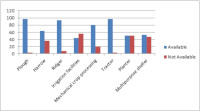Mechanization Problems of Peasant Farmers in Oyo Metropolis, Oyo State, Nigeria
Keywords:
Agricultural mechanization, Peasant farmers, farming operationsAbstract
This survey is carried out to assess the mechanization problems of peasant farmers in Oyo metropolis. The population of the study comprises all peasant farmers in Oyo metropolis of Oyo State. Ten communities were systematically selected in the study area namely: Aba Iyaibeji, Offa meta, Fashola, Eleekara, Baale Agbe, Oko Ajagba, Eleke, Soku, Otefon and Mogaji. Multistage sampling technique is employed to collect data from 400 farmers in the study area using structured questionnaire. The data are analysed using frequency count and simple percentage. Findings reveal that most of the farmers are male with low or no level of education. Most farming operations are carried out manually and implements are being mostly hired. Inadequate capital is the major problem affecting farmers in the study area while other problems include land tenure system, lack of equipment, government policy, lack of storage facilities, and insufficient farm input. The study also shows that most of the farms in the area range from 1-5 acres and farmers in the study area are poor to employ irrigation facilities even though 80% of the foods consumed in this country come from the peasant farmers in the rural areas. In summary, it is revealed that mechanization practice is still at a premature stage in the Oyo metropolis. Therefore, enlightenment programme should be done by extension officers all over rural areas to improve the knowledge of farmers about the advantages of mechanized farming.
References
Adekanye, T. A. (2014). Assessment of mechanization problems of peasant farmers in Irepodun local government area, Kwara State of Nigeria. Advances in Agriculture, Sciences and Engineering Research Journal, 4 (6), 1665- 1672.
Anazodo, U. G. N. (1980). Agricultural mechanization as a catalyst for rural development. Paper presented at the national seminar on achieving even development in Nigeria. Economic Development Institute, University of Nigeria, Enugu campus.
Bishop, C. (1997). A guide to preparing an agricultural mechanization strategy, food and agriculture organization of the United Nations. Rome, Italy. Pp 37.
Chisango, F. F. T. and Dzama, T. (2013). An assessment of Agricultural mechanization index and evaluation of agricultural productivity of some fast tract resettlement farms in Bindura district of mashonaland central province, Zimbabwe. International Journal of Social science and Interdisciplinary Research, 2 (7):62-82.
Clarke, L. J. (2000). Strategies for agricultural mechanization development. Agricultural Support System Division, FAO, Rome, Italy. Pp 7.
FAO (1998). Motorized soil tillage in West Africa: A survey on the current use and consequences of tillage done with engine driven machinery. FAO Regional office for Africa Accra, Ghana and Agricultural engineering Branch, Agricultural support systems division, FAO, Rome, Italy.
Ituen, E. U. U. (2009). Farm mechanization challenges and prospects in Akwa Ibom State of Nigeria. Journal of Agricultural Engineering and Technology, 17 (2), 69-75.
Jijingi, H. E., Simeon, P. O. and Samo, A. D. (2016). Assessment of mechanization challenges of peasant farmers in Gboko local government area, Benue state of Nigeria. Scientific papers series Management, Economic Engineering in Agriculture and Rural Development. 16(4), 191-197.
Kienzle, J., Hancox, W. and Ashburner, J. (2010). Tractor based services and related support polices in developing countries. Paper presented at 18th World Congress of the International Commission of Agricultural and Biosystems Engineering (CIGR), Quebec City, Canada.
Nowacki, T. (1974). Example of technical economic analysis of mechanized process in various agro-Technical conditions: Economic commission for Europe AGRI/MECH/32.
NPC (2006). Population Census. Abuja: National Population Commission of Nigeria.
Olaoye, J. O. and Rotimi, A. O. (2010). Measurement of agricultural mechanization index and analysis of agricultural productivity of farm settlements in southwest Nigeria. Agric. Eng. Intl. the CIGRJ, 12 (1), 125- 134.
Owombo, P. T., Akinola, A. A., Ayodele, O. O. and Koladeye, G. F. (2012). Economic impact of agricultural mechanization adoption; evidence from maize farmers in Ondo state, Nigeria. Journal of Agricultural and Biodiversity Research, 1 (2), 25-32.
Tshima, M. C. (2014). Understanding the small-scale agricultural sector as a precondition for promoting rural development in South Africa. African Journal of Agricultural Research, 9 (3), 2409-2418.

